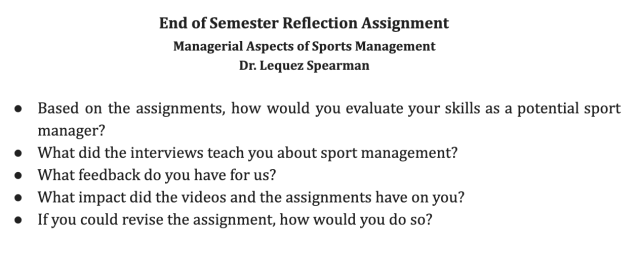
As this is the second semester of our WAC project, I’m happy to report on the assignments and student performance. In short, with the help of Cheyenne Ross, undergraduate coordinator, I’ve come up with a way to merge student creativity with the technical writing required in sport management. During the Spring of 2019, Cheyenne Ross and I combed through hours of video footage to create assignments that encourage writing, experimentation and reflection. Two of the three writing assignments require students to write a (1) formal job description and a (2) semi-structured interview protocol. The first assignment was difficult in that some students felt restricted by the status quo: the traditional paper. We did use this snafu as a teachable moment to demonstrate to students that they are encouraged to abandon the paper format. Students who work in the managerial capacity are more likely to write a one-off assignment (job description) than a 4-page paper. I did enjoy reading the assignments as the students wrote in a way that was relevant to them. As an example, I thought students would choose the interviews with my “high-profile” participants, including, the New York Giants producer, the E-Sports practitioner, and the assistant general manager of a baseball team. Unbeknownst to me, the majority of the students preferred the interview with the gym manager of Powerhouse in Bayside, Queens. Although I did not poll the students about why they gravitated to the gym manager, I could glean from the two writing assignments that their selection of this particular professional was personal. Students wrote about the very things that Frank cited in the interview, including, inconsiderate patrons, dirty bathrooms, and people who grunt on the bench press.
I found that the second assignment enabled students to insert their positionality into the writing. In addition to coming up with interview questions, the students also had to explain their justification for said questions. To that end, in defending why they chose one question or a series of questions over the alternative, students not only write about what they qualify as important in the interview, but they also discuss what is meaningful to them. Students continued with Frank’s role as a gym manager by asking a potential floor lead about work ethic, punctuality and soft skills. One of the items that really resonated with students was how Frank has to de-escalate situations that can easily lead to violence in the gym.
Although I was shocked that the majority of the students did not choose the interviews with high-profile sport management practitioners, I’m satisfied with the writing that was produced. I appreciate how some students used the assignments to marry class discussion and content to the technical writing required in the assignment. I was also pleased with the ways in which my students found pockets to be creative. As an example, one student produced an assignment that read as an actual script. Another student used the Powerhouse Gym interview to ground the majority of the questions in conflict and crisis management. Going forward, instead of trying to secure interviews with the typical 9-5 professional in Manhattan, I should think about interviewing more entrepreneurs, including, salsa studio owners, owners of bike shops, and personal trainers. Because of this experience I learned that while technical writing is reputed as being neutral and impersonal, these writing assignments gave rise to student creativity.
